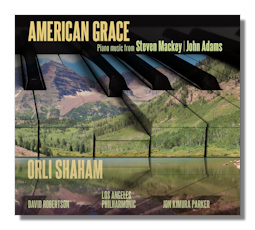
The Internet's Premier Classical Music Source
Related Links
-
Adams Reviews
Mackey Reviews - Latest Reviews
- More Reviews
-
By Composer
-
Collections
DVD & Blu-ray
Books
Concert Reviews
Articles/Interviews
Software
Audio
Search Amazon
Recommended Links
Site News
 CD Review
CD Review
American Grace

Piano Music
- Steven Mackey:
- Stumble to Grace 1
- Sneaky March
- John Adams:
- Hallelujah Junction 2
- China Gates
Orli Shaham, piano
2 Jon Kimura Parker, piano
1 Los Angeles Philharmonic Orchestra/David Robertson
Canary Classics CC11 50min
This is an important release, especially for those interested in contemporary music or, more specifically, American contemporary piano music. Stephen Mackey's piano concerto entitled Stumble to Grace (2011) is a very intriguing work. Written in five continuous movements, each subtitled sequentially from Stage 1 to Stage 5, the concerto evolves from a sort of deliberately clumsy piano part in Stage 1 to a very sophisticated style in Stage 5, where we eventually hear a quite complex and graceful fugue. What seems to be running parallel to the pianistic evolution is a sort of orchestral developmental process as well: the music appears to be awakening in Stage 1 with rather primitive sounds emanating from the orchestra, which continue into the first part of Stage 2, where the percussion is quite overwhelming. Stages 3 & 4 are mostly slow and introspective, the piano seeming to weave a deeper and more subtle expressive language.
Mostly everything in the concerto has a fresh and innovative quality about it, though there are a few, probably unintentional nods to other composers. Stage 2 features music in the latter moments that more than vaguely recall the Martinů piano concertos, both in the piano and orchestral writing (try the passage beginning at 4:10, track 5). In Stage 5 some of the music in the last half is reminiscent of Bernstein. That said, one still cannot say the music is imitative in any significant way.
In the end, this must be assessed a quite worthy composition and perhaps an important contribution to the literature of the piano concerto in the 21st century. One often has to live with a work for a while to truly assess its artistic worth, but I can say this piece is approachable and stylistically different enough to convince you that you're hearing a new and important voice. It's Mackey's first major piano composition, according to the album notes, and thus one has to admire his effort here. The piece was written for Orli Shaham, on a co-commission from the Los Angeles Philharmonic Orchestra, St. Louis Symphony Orchestra, and New Jersey Symphony Orchestra. Shaham premiered the work and this is its first recording. Her performance seems beyond cavil and the playing by the LA Philharmonic under the direction of David Robertson (her husband) is spirited and convincing: the players perform as if this were a piece long in their repertory.
The opening work on the CD is John Adams' Hallelujah Junction (1996), a two-piano, three-movement work, loosely employing minimalist techniques, but still depending heavily on the subtleties of evolving thematic ideas amid the sense of much repetition. The first movement is vivacious and upbeat, and reminds one of insistent tolling bells. The concluding, off-kilter rhythmic chords are quite Stravinskyan. The second movement is serene, though there is a feeling of developing tension midway through in the lively flowing music. The final movement quickly develops an agitated manner, but the rhythms remain bouncy in their jazzy frothiness. The mood then turns almost madcap before finally settling into a proudly quasi-Gershwinian gait that eventually stumbles repeatedly in its deftly wrought boogie-woogie hooliganism. This is quite catchy and humorous stuff that sounds very difficult for pianists Shaham and Parker to play. Bravo! They deliver the goods with a virtuosic display.
The closing pieces are interesting morsels. Mackey's brief Sneaky March is intended for children and has the feel though not the style of some of Prokofiev's Music for Children, Op. 65. In listening to Adams' China Gates (1977) I couldn't help but thinking that if Debussy had somehow been able to dabble in minimalism, he might have produced something like this. It can be mesmerizing to hear with all the running eighth notes and shifting modes. The music seems to develop toward something but ends up back at the beginning: indeed, Adams describes the work as palindromic in structure. Again, the performances by Orli Shaham are quite convincing. The sound reproduction is excellent and the notes very informative. If you're interested in contemporary piano music, this disc will surely have a lot to offer.
Copyright © 2014, Robert Cummings





















